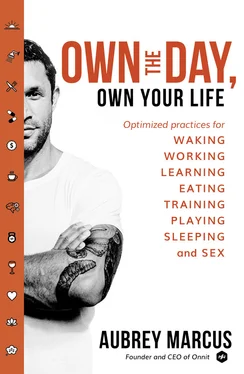Salt has been a part of our diet for millennia. Roman soldiers of antiquity were “paid” with an allotment of salt. The words salt and salary are derived from the same Latin root word: sal . When we describe people’s worth or utility, we refer to whether they are “worth their salt.” So why was salt such a big deal? Well, if you were a Roman soldier marching around the empire, swinging swords everywhere you went, you had to hydrate and replenish the minerals you lost through sweat, and salt was the surest way to do that.
Can you overdo salt consumption? Of course you can. All medicine becomes poison at a certain dose, but the point of all this is that salt, particularly in its most mineral-rich form, is not the demon it has been made out to be. As for which sea salt to choose, pink Himalayan salt comes from ancient oceanic deposits—long before oil tankers and Jet Skis were crisscrossing Earth’s waters—and also has the benefit of additional iron, which gives it its pink hue. For women who tend to be lower in iron, cooking, seasoning, and mineralizing with pink salt is a great option. But any regular old sea salt will do, as long as it comes from a good source. Kosher salt means nothing nutritionally; it is purely a religious distinction, so don’t get confused. Shalom!
Get Lit
You can give a plant all the water it will ever need, but if it isn’t exposed to enough light, it just won’t grow. It’ll only drown. The same is true for human beings. You can hydrate until you have mineral cocktail coming out of your ears, but that’s only one of the variables in this morning math problem we’re trying to solve. A lack of sufficient or timely exposure to light will short-circuit every attempt you make to start your mornings off with the kind of energy necessary to own the day. This is a problem that everyone faces, from students to self-employed moms to workaholic dads to professional athletes. Biologically we are supposed to wake up with the sun and go to sleep with the stars. This is the timing that our body patterned for millennia, and the essence of circadian rhythm.
To the average person, circadian balance might not seem all that important until you realize that, as your circadian rhythms go, so goes the rest of your life. Women with atypical circadian rhythm, for example, have unusual eating and hormone patterns. This physiological and behavioral cycle follows the typical twenty-four-hour day, and controls a huge variety of biological processes, from the sleep-wake cycle to body temperature, metabolism, and even the life of the cell. The timing of these rhythms can easily become altered by the environment or choices we make, which can cause internal desynchronization. Sometimes this desynchronization manifests as jet lag, sometimes as sleep problems. There is even an association with increased incidence of cancer. Not to mention waking up extremely freaking early, even though all you really want to do is sleep in a little bit. What this means, very simply, is that the more synchronized your circadian rhythms are, the better your life becomes.
The strongest synchronizing agent for the circadian system? You guessed it: light. Specifically, blue light. Even more specifically, environmental light, aka sunlight, which is the most natural and abundant source of blue light. None of this should be too much of a surprise. The natural life-giving, regulating force of the sun—whether we understood it as a source of blue light or not—has drawn humans toward it for millennia. It’s why we find ourselves wandering out so often to look at the sky during dawn and at dusk. It’s why sunset cruises are so popular at beach vacation resorts. It’s why the road up to Haleakala Crater on Maui is packed at 4:00 a.m. during the high season in anticipation of the epic sunrise. It speaks to us. It’s our body being drawn, unconsciously, to the energy and rhythm of the sun. When we deny it, we begin to fall out of our own rhythm. When we accept and engage it, things begin to fall into place.
To rely on the sun to live in accord with Earth’s natural biorhythms, however, is virtually impossible in modern life. Everyone would have to go to bed shortly after it gets dark (for most of us equator huggers, that’s around 9:00 p.m.) and wake up when it’s light (around 6:00 a.m.). The real world often requires a different schedule. Maybe you’re a very early riser, or you sleep during the day and work at night, or you simply decide that nocturnal pleasures outweigh the delights of dawn. (Personally, I enjoy when the house is quiet after 10:00 p.m., so I prefer a midnight–7:00 a.m. sleep schedule.) Whatever the reason, you and the sun might not be on speaking terms on occasion. This creates a twofold problem: circadian rhythm disruption and a lack of means for fixing it.
This is what Duncan Keith, assistant captain of the NHL’s Chicago Blackhawks, was feeling during his 2014–15 season. His body clock was getting out of whack because he traveled a lot and worked at night in a profession where he spends most of his time during the season in darkness. A lot of hockey cities are in the frozen north, above the wall where the wildlings live, and two-thirds of the regular season schedule take place there, coinciding with the curious daylight savings custom. This meant that walking outside to get some sunlight was rarely an option for Duncan. As a result, his circadian rhythms were often out of sync with the ebbs and flows of his life. It was enough that he was noticing an effect on energy and alertness come game time.
To help solve Duncan’s problem, we talked about a tweak to his routine that everyone can, and should, make to their own routine to reset their circadian rhythms. He got into the light every time he woke up—from sleep or from a nap.
The results of this blue-light tweak, with other supplement and nutrition improvements to Duncan’s game-day protocol, speak for themselves: not only did the Blackhawks go on to win the Stanley Cup that year, but Duncan was named Finals MVP as the winner of the Conn Smythe Trophy. ESPN called his performance during the postseason an “indefatigable two-month surge” and “one of the most dominant … in NHL history.” He played more than thirty minutes per game and logged more than 700 minutes of playing time over the course of the playoffs—both of which are ridiculous numbers that put him in rarefied company as a defenseman. I’m not going to take any credit for his performance—he’s a fucking savage—but the adjustment to his postsleep light exposure and the rest of the tips and tactics you’ll find in this book certainly didn’t hurt! And it certainly won’t hurt your performance either.
Movement
I haven’t said anything about order for these first three essential ingredients to the perfect wake-up, but I will tell you how I start the best of my mornings: I wake up quietly. I have my morning mineral cocktail. I step outside into the rising sun. Then I sneak up on my just-waking fiancée. With ninja stealth, I make a slow and calculated attack. She protests, I laugh. I tease her in a bad Portuguese accent about her nickname “Miss2Jits” and the fact that she is a blue belt and I’m just a white belt. Eventually she’s had enough of my mouthiness and we grapple to see who can gain dominant position.
To me, there is no better start to the morning than this. It’s a chance to practice my “jits” and wrestle with a beautiful naked woman. While it’s a disaster for keeping the fitted sheet on the mattress, it’s totally worth it. If you’ve never tried coed naked jujitsu, you haven’t really lived! (Side note: Remember how popular those Coed Naked sports shirts were? Whatever happened to those?) But this isn’t just a fun little diversion to delay getting to work. There is real science behind adding a few minutes of playful activity in the morning. Even light exercise boosts circulation and improves cognitive performance. It releases endorphins and, most important of all, helps entrain that fickle bastard, our circadian rhythm. In addition to sufficient blue-light exposure, regular activity—however brief—sends strong cues to the body that it is time to wake up and get going. It helps set that internal biological clock.
Читать дальше












